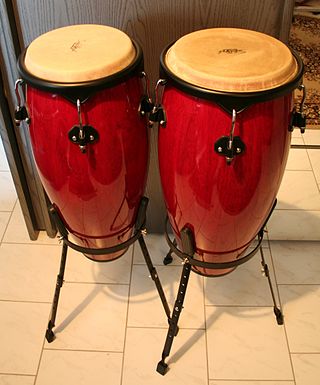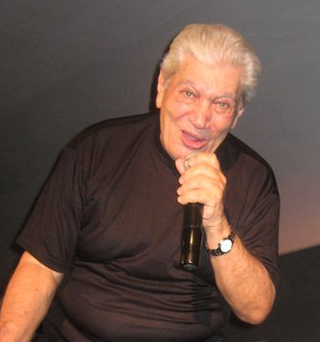
Salsa music is a style of Caribbean music, combining elements of Cuban, Puerto Rican, and American influences. Because most of the basic musical components predate the labeling of salsa, there have been many controversies regarding its origin. Most songs considered as salsa are primarily based on son montuno and son Cubano, with elements of cha-cha-chá, bolero, rumba, mambo, jazz, R&B, rock, bomba, and plena. All of these elements are adapted to fit the basic Son montuno template when performed within the context of salsa.

Fania Records is a New York–based record label founded by Dominican-born composer and bandleader Johnny Pacheco and his American lawyer Jerry Masucci in 1964. The label took its name from a popular luncheonette frequented by musicians in Havana, Cuba that Masucci frequented when he worked for a public relations firm there during the pre-Castro era. Fania is known for its promotion of salsa music.

Héctor Juan Pérez Martínez, better known as Héctor Lavoe, was a Puerto Rican salsa singer. Lavoe is considered to be possibly the best and most important singer and interpreter in the history of salsa music because he helped to establish the popularity of this musical genre in the decades of 1960s, 1970s and 1980s. His personality, style and the qualities of his voice led him to a successful artistic career in the whole field of Latin music and salsa during the 1970s and 1980s. The cleanness and brightness of his voice, coupled with impeccable diction and the ability to sing long and fast phrases with total naturalness, made him one of the favorite singers of the Latin public.

Raymundo "Ray" Barretto Pagán was an American percussionist and bandleader of Puerto Rican descent. Throughout his career as a percussionist, he played a wide variety of Latin music styles, as well as Latin jazz. His first hit, "El Watusi", was recorded by his Charanga Moderna in 1962, becoming the most successful pachanga song in the United States. In the late 1960s, Barretto became one of the leading exponents of boogaloo and what would later be known as salsa. Nonetheless, many of Barretto's recordings would remain rooted in more traditional genres such as son cubano. A master of the descarga, Barretto was a long-time member of the Fania All-Stars. His success continued into the 1970s with songs such as "Cocinando" and "Indestructible". His last album for Fania Records, Soy dichoso, was released in 1990. He then formed the New World Spirit jazz ensemble and continued to tour and record until his death in 2006. He is the father of American vocalist and saxophonist Chris Barretto, best known for his work with Periphery and Monuments.
Carlos Manuel "Charlie" Palmieri was a Puerto Rican bandleader and musical director of salsa music. He was known as the "Giant of the Keyboards".

Eddie Palmieri is an American Grammy Award-winning pianist, bandleader, musician, and composer of Corsican and Puerto Rican ancestry. He is the founder of the bands La Perfecta, La Perfecta II, and Harlem River Drive.
A descarga is an improvised jam session consisting of variations on Cuban music themes, primarily son montuno, but also guajira, bolero, guaracha and rumba. The genre is strongly influenced by jazz and it was developed in Havana during the 1950s. Important figures in the emergence of the genre were Cachao, Julio Gutiérrez, Bebo Valdés, Peruchín and Niño Rivera in Cuba, and Tito Puente, Machito and Mario Bauzá in New York. Originally, descargas were promoted by record companies such as Panart, Maype and Gema under the label Cuban jam sessions. From the 1960s, the descarga format was usually adapted by large salsa ensembles, most notably the Fania All-Stars.
The Fania All-Stars is a musical group formed in 1968 as a showcase for the musicians on Fania Records, the leading salsa music record label of the time.
Larry Harlow was an American salsa music pianist, performer, composer, band leader and producer. He was born into a musical American family of Jewish descent.

Juan Pablo Knipping Pacheco, known as Johnny Pacheco, was a Dominican musician, arranger, composer, bandleader, and record producer. Born in the Dominican Republic, Pacheco became a leading figure in the New York salsa scene in the 1960s and 1970s as the founder and musical director of Fania Records.

Pedro Juan Rodríguez Ferrer, better known as Pete "El Conde" Rodríguez, was a salsa singer born in Barrio Cantera, Ponce, Puerto Rico. His son, also named Pete Rodriguez, is also a salsa and jazz musician. His daughter, Cita Rodriguez, is also an accomplished salsa singer.

Barron W. "Barry" Rogers was an American jazz and salsa trombonist.

Adalberto Santiago is an internationally known salsa singer.
Gerald "Jerry" Masucci was an American attorney, businessman and was co-founder of Fania Records.
Ramón Quián, better known as Monguito "El Único", was a Cuban vocalist, bandleader, producer and composer. An Afro-Cuban sonero, he had a simple improvising style with a distinctive nasal voice.
While the Dominican Republic is known for shaping merengue and bachata music, its musicians have also melded these influences into the early development of salsa music amongst the Latin community of New York City in the early 1960s. A major development in those initial days of salsa occurred when Johnny Pacheco, a Dominican-born musician living in New York City, teamed with partner Jerry Masucci to create Fania Records in 1964. They started selling records from the trunk of cars on the streets of Spanish Harlem, signing up young artists, creating new sounds, and eventually having hit records. Over the next 15 years, Fania Records helped define the sound, culture, and language associated with the salsa genre, a musical movement that arose partly from the unavailability in the United States of music produced in Cuba.

James Mui, known professionally as Chino Rodriguez, was an American musician and impresario who specialized in Latin music, salsa and Latin jazz.
Steven Alan Gluzband is an American latin jazz trumpeter based in New York City.
Edwin "Eddie" Montalvo is an American percussionist and bandleader of Puerto Rican descent. Born and raised in the Bronx, he best known for playing the Congas for Hector Lavoe, Rubén Blades as well as with the Fania All-Stars.
Juan “Juancito” Torres Velez, also known as "La Trompeta Nacional De Puerto Rico", was a Puerto Rican salsa and jazz trumpet player, composer, arranger, producer and musical director best known for his association with the Fania All-Stars from 1979 to 1985. He was known as a great soloist, specializing in upper register.










